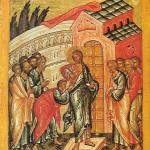
I am already pretentious enough as it is. How could I not be? I grew up Protestant evangelical in a suburb of San Francisco, which means that I am not even from San Francisco itself. I am second-generation Chinese, the kind of people who desperately want to escape their parents’ Chineseness and to be accepted by a society that throws them lets them eat the crumbs of respectability from beneath the table as the model minority. By saying that I’d be pretentious af if I were Latin, I am not denying that I am still working through my pretentiousness on my slow journey toward holiness. I’m just saying that I’d have been pretentious af.
I confess, and do not deny, but confess freely that if I had joined the Catholic communion through the Latin Church, I’d quickly have become a rad trad. My evangelical friends, especially those who remember me as an Anglican, will recall my unusual interest in law, especially of the ecclesial variety. In those days, I was also prone to writing in code Latin, which is a way of obfuscating what I’d like to say by appealing to a foreign language to appear superior. The closest equivalent I can think of is white men writing and speaking in Chinese, just to show off. I distinctly recall one conference I was at where a group of white men were talking in exquisitely pompous New England accents and peppering their discourse with Chinese and Japanese phrases as if they were reviewing the fine art of an exotic culture. Unfortunately, being Chinese myself with second-generation baggage with Chineseness, I cannot bring myself to join in this kind of orientalist exotification. For me, the occident is the other that I wish were my mirror, and its language is Latin. In the Lord’s wisdom, he made me join a church in full communion with the Latin Church, but shows what such occidental desire does: it manifests as the ugliness of uniatism. Granted, most people who know something about uniatism only know it as the pejorative term that the Orthodox use to refer to us Eastern Christians who are in communion with Rome. But to be a uniate in the sense that I’m using it – which is the way that it’s used in Eastern Catholic theology – is to be what the Eastern Catholic theologian Cyril Korolevsky calls Eastern Catholics who have chips on their shoulders and thus prefer Latin formulations to the rich heritages of their own Eastern churches. It’s ugly because it’s pretentious af.
The story of how I became such a pretentious poser is again through music. As I mentioned when I began this series, the Canadian Brass had come out with an album titled Sacred Brass in which they had singers accompanying their brass playing. One of the pieces they covered was Allegri’s Miserere, an arrangement of the fiftieth psalm that has a part where the soprano (or in this case, the trumpet) hits a high-C in a way that edges on a shriek. I was fascinated by all the Latin that they used in this album, including in Palestrina’s Missa Ascendo ad Patrem, and I decided to learn what the words were. To that end, I – a Protestant kid – printed out the words of the Tridentine Mass and created a secret stash in my room the way that kids a generation before me would have hidden their copies of Playboy.
Stopping by Borders not long after this, I came across another cd. This one was just titled Best of the Renaissance, and sure enough, it had the Allegri Miserere on it, as well as a treasure trove of other masses, including Palestrina’s more famous Missa Papae Marcelli. I looked to see who was singing it, and the cover said ‘Tallis Scholars.’ Sold, said I, if the singers were scholars. I didn’t know who Tallis was. But it sounded scholarly, so I bought it.
The second track was what got me. It was the Spem in alium, a motet that Thomas Tallis had written with forty independent voices, arranged in eight choirs of five voices each. I thought Bach was crazy with his two or three parts; this one had forty. I listened in awe, and then I decided to learn the words, which was another divine practical joke because spem in alium nunquam habui praeter in te, Deus Israel may sound like a Protestant saying that they are justified by faith alone in the God of Israel, but actually it’s from the Book of Judith, which Protestants like me thought were not biblical. I quickly went out and got another cd from the Tallis Scholars, this one actually titled Spem in Alium, and played it incessantly. I even started singing along. When that happened, my sister – who could hear all of this going down in the room next to her – trolled my pretentious behind. ‘Spam, spam?‘ she said. ‘What’s next? CORNED BEEF AND HAM??’
Pretentiousness lies in the gap between fantasy and reality. In fantastic terms, I was becoming more and more cultured the more Latin I was learning. The reality was that I realized during a gym mass at the Catholic high school that all those fancy Latin words in the Gloria in the mass settings – laudamus te, benedicimus te, adoramus te, glorificamus te – were the same words being sung in the post-Vatican II, Disney-wannabe tunes often taken by cantors who were often a quarter-pitch flat: we praise you, we bless you, we adore you, we glorify you. I preferred the Tallis Scholars, though. In fact, in one of my greatest acts as the Great Pretender, I came back from junior prom after a night of what I considered very loud music (because I was a pretentious 60-year-old in a 16-year-old body) and put on the Tallis Scholars and let it wash over me to cleanse me from all that hip-hop.
As long as I remained an evangelical – especially in the Chinese church – this pretentious chasm was fine. It is easy to fool Chinese evangelicals into thinking that you are an intellectual because you appear to know Latin (and Greek). Then I became an Anglican, and it was still fine because I was a Chinglican, which means that I stayed within Chinese evangelical circles in Vancouver anyway. In my own time, I was getting into theologians like Balthasar, whose meditations on Mary’s fiat gave me another pretentious line to add to my spiritual-sounding vocabulary (fiat mihi secundum verbum tuum). As some of this stuff leaked out onto facebook, my friends told me to just convert already.
But something held me back, and I think it was that I knew that I was a poser. If I really joined the Latin Church, they’d figure me out. It was safe where I was. In some ways, this is why encountering Eastern Catholics through the Umbrella Movement was such a disaster for me. It meant that I had to stop posing. Eventually I did convert – but to a church that is made fun of by both the Latin Church and the Orthodox for being a bunch of uniate posers.
There is a unique grace to this journey. Thinking that I could become intellectually superior by posing as someone who knew Latin because I listened to the Tallis Scholars, I have been driven instead into a church where we struggle with a kind of agonizing conscientization about who we are in relation to the Latin Church. As Korolevsky shows, it was often because Eastern Catholics had a chip on our shoulders, both because we thought our theology was inferior to the Latin Church and because our people were historically in situations of colonial disadvantage, that we sought to look more Latin than we actually were. Our churches, in other words, are churches of posers, pretentious af, aspiring to be the model minority to the max. In becoming conscious of our consciousness, we realize that such pretentiousness is not spiritual. It gets in the way of our relationship with the Lord, and it is ugly af. From this complex, we are called to repent, which probably means that the church that I am in is the perfect place for me to continue my lifelong journey of divesting of my pretentiousness too.
I was nominated by our blog’s former resident Latin Catholic Person, Eugenia Geisel, to do the Facebook Album Art Challenge. Posting the covers gave me some nostalgia that I wish to work through. I am therefore blogging about it too now concurrently. Perhaps Eugenia will do so as well on her blog, Lipstick on My Relics. This is the sixth of ten in the series.
















